
The First Hundred Years of Mikhail Bakhtin (English Edition)
- 作者
- Caryl Emerson
- 语言
- 英语
- 出版社
- Princeton University Press
- 出版日期
- 2018年6月5日
- 纸书页数
- 296页
- 电子书格式
- epub,pdf,mobi,azw3,txt,fb2,djvu
- 文件大小
- 37753 KB
- 下载次数
- 2625
- 更新日期
- 2023-05-14
- 运行环境
- PC/Windows/Linux/Mac/IOS/iPhone/iPad/iBooks/Kindle/Android/安卓/平板
内容简介
Among Western critics, Mikhail Bakhtin (1895-1975) needs no introduction. His name has been invoked in literary and cultural studies across the ideological spectrum, from old-fashioned humanist to structuralist to postmodernist. In this candid assessment of his place in Russian and Western thought, Caryl Emerson brings to light what might be unfamiliar to the non-Russian reader: Bakhtin's foundational ideas, forged in the early revolutionary years, yet hardly altered in his lifetime. With the collapse of the Soviet system, a truer sense of Bakhtin's contribution may now be judged in the context of its origins and its contemporary Russian "reclamation."
A foremost Bakhtin authority, Caryl Emerson mines extensive Russian sources to explore Bakhtin's reception in Russia, from his earliest publication in 1929 until his death, and his posthumous rediscovery. After a reception-history of Bakhtin's published work, she examines the role of his ideas in the post-Stalinist revival of the Russian literary profession, concentrating on the most provocative rethinkings of three major concepts in his world: dialogue and polyphony; carnival; and "outsideness," a position Bakhtin considered essential to both ethics and aesthetics. Finally, she speculates on the future of Bakhtin's method, which was much more than a tool of criticism: it will "tell you how to teach, write, live, talk, think."
The First Hundred Years of Mikhail Bakhtin (English Edition) EPUB, PDF, MOBI, AZW3, TXT, FB2, DjVu, Kindle电子书免费下载。
- 新婚必读全书(全新第三版)(协和名医写给新婚夫妇的指导书!让新婚生活快乐无忧!) 郎景和
- 日本妈妈这样教负责 (世界妈妈TOP教养智慧系列) 孙玉梅
- 婴幼儿营养与饮食调理全书(3岁前的饮食习惯将影响宝宝一生的健康 分析常见病因,调整营养搭配,对症食疗好得快! 融汇中西理念,倡导科学喂养,防病强体长得壮!) 邹春蕾
- 坐月子与新生儿护理全书(科学与传统相结合的坐月子&新生儿护理经验) ibaby母婴项目组
- Jazz Age Jews (English Edition) Michael Alexander
- Justice Is Conflict (Princeton Monographs in Philosophy Book 7) (English Edition) Stuart Hampshire
- Social Foraging Theory (Monographs in Behavior and Ecology) (English Edition) Luc-Alain Giraldeau、Thomas Caraco
- 起点(孙瑞雪新作,爱和自由科学教育公益巡讲15年的枕边伴读;孙瑞雪教育机构创立爱和自由教育23年来唯一整体结构性呈现) 孙瑞雪
- Virginia Woolf's Nose: Essays on Biography (English Edition) Hermione Lee
- 洪昭光谈家庭健康(修订本) 洪昭光
- 陪孩子走过0~6岁敏感期(徐小东作品!真正的蒙氏教育在家庭!全程追踪0~6岁孩子的敏感期!) 徐小东
- The Papers of Thomas Jefferson, Volume 27: 1 September to 31 December 1793 (English Edition) Thomas Jefferson、John Catanzariti
- 越温和,越有力:0~6岁孩子行为问题正面教养策略 唐文渊
- 改变你思维方式的必读小说(共五册) 张新捷、(奥)西格蒙德·弗洛伊德、王晋华、黄永华、田伟华、赵丽慧
- 卡尔·威特教育全书(畅销全球的亲子教育经典,销量达上亿册!权威的精装珍藏本,你值得拥有!) ﹝德﹞老卡尔·威特、小卡尔·威特
- Colors and Blood: Flag Passions of the Confederate South (English Edition) Robert E. Bonner
- The Theater and Cinema of Buster Keaton (English Edition) Robert Knopf
- Unsolved Problems in Astrophysics (Princeton Series in Astrophysics) (English Edition) John N. Bahcall、Jeremiah P. Ostriker
- The Claims of Culture: Equality and Diversity in the Global Era (English Edition) Seyla Benhabib
- Athenian Legacies: Essays on the Politics of Going On Together (English Edition) Josiah Ober
- 高效能养育(百万粉丝公号“暖暖妈爱分享”创始人赵君潇全新家教作品,52个核心教育理念,为孩子创造人生选择权) 赵君潇
- 从容养育:成长自我,成就孩子(百万粉丝赞誉的“有温度有态度的育儿大V”。从国考赢家的公务员妈妈到每年实现销售额过亿“小目标”的个人创业辣妈。独家分享如何在焦虑时代从容养育经,成长孩子、成就自己。) 罗罗
- 金牌月嫂手把手教你护理新生儿(金牌月嫂亲自支招,实操性强、面面俱到的新生儿护理方法) 王玉梅、张淑波
- The Papers of Thomas Jefferson, Volume 23: 1 January-31 May 1792 (English Edition) Thomas Jefferson、Charles T. Cullen
- Britain's Reptiles and Amphibians (Britain's Wildlife) (English Edition) Howard Inns、Chris Packham
- 把金牌月嫂请回家2:催乳按摩与母乳喂养专家指导 周英
- 家庭亲密育儿法(新浪、搜狐名博博主玛希娅10年北美家庭教育研究成果,融合国际视野和教育新知的育儿工具书) 玛希娅
- The Open Society and Its Enemies (Princeton Classics Book 119) (English Edition) Karl R. Popper
- 二宝妈妈研究"生"笔记:有肚的地方就有江湖(升级版)(天涯百万点击畅销书升级版,有肚的地方就有江湖) 牵牛妈
- Law, Violence, and the Possibility of Justice (English Edition) Austin Sarat